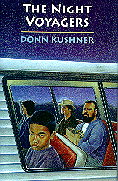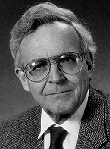

|
The Night Voyagers.
Donn Kushner.
Toronto: Lester Publishing, 1995. 220pp, paper boards, $16.95.
ISBN 1-895555-69-8. CIP.
Grades 6 - 9 / Ages 11 - 14
Review by Ted Monkhouse.
|
Many of us recall the stream of political refugees fleeing the death
squads of the U.S. supported, right-wing regimes of Guatemala and El
Salvador. Many of us recall the "underground railway" to Canada, set up
by the sanctuary movement of predominantly American churches and
synagogues hiding these refugees from U.S. immigration authorities, who
feared they might be left-wing extremists or Communists. Many of us will
recall newspaper accounts of these refugees holed up in church basements
and safe houses awaiting Canadian immigration hearings. Some of us will
also recall their deportations, having been tricked into signing
"deportation" documents. Most of us will recall this as an era of
soul-searching over the immigration issue.
The Night Voyagers is a fictional account of one
family fleeing their Central American homeland after the death squads
have claimed the father, a "disappeared." The story is seen largely
through the eyes of the traumatized younger son (ten years old at its
beginning) as he, his mother, and older brother flee northward through
Mexico and the U.S. To Canada.
The story also paints a picture of civil disobedience practiced by
morally outraged citizens, thwarting a harsh immigration policy and those
who carry it out. However, the author also incorporates the cultural and
mythological heritage of these refugees into the story as they adjust to
their new conditions. It is a sad story with a happy ending -- but filled
with hope throughout.

Kushner, an eminent microbiologist at the University of Toronto, is
also the award-winning author of The Violin Makers Gift
(CLA Book of the Year) and Book Dragon (IODE Book Award), as
well as a picture book, Dinosaur Duster. However,
The Night Voyagers presents the reader with difficulties.
The language, though technically correct, is not as easy flowing and
natural as one might hope. In addition, the mingled reality and
supernatural imaginings of the young hero are confusing to the reader,
and require some perseverance to sort out.
Kushner perhaps is as zealous as his protagonists in trying to
integrate too much culture, mythology, and symbolism -- as well as
inconsequential detail -- so that the story gets bogged-down
unnecessarily. The publisher suggests an interest level of age eleven and
reading level of grades six to nine. I don't believe many youngsters of
that age would stick with it, voluntarily. A glossary and listing of
sources help only slightly. This story will probably be read to achieve
specific purposes but, I suspect, infrequently for pleasure.
Recommended for use in discussion about immigration and multicultural issues.
Ted Monkhouse is a retired teacher-librarian in Guelph, Ontario.

Copyright © 1995 the Manitoba Library Association.
Reproduction for personal use is permitted only if this copyright notice is
maintained. Any other reproduction is prohibited without permission.
Published by
The Manitoba Library Association
ISSN 1201-9364
 Go back to CM Welcome page
Go back to CM Welcome page
 Go back to Table of
Contents for this Issue
Go back to Table of
Contents for this Issue





 Go back to CM Welcome page
Go back to CM Welcome page
 Go back to Table of
Contents for this Issue
Go back to Table of
Contents for this Issue